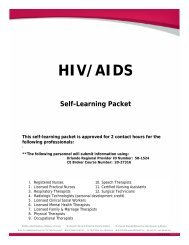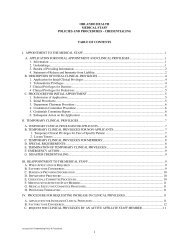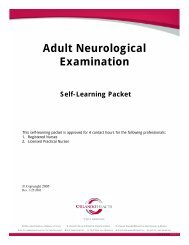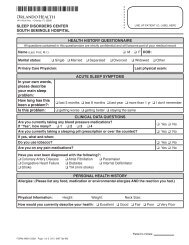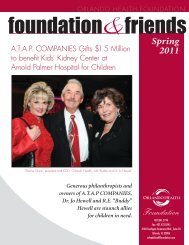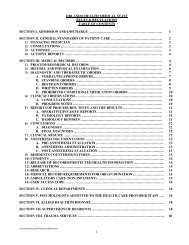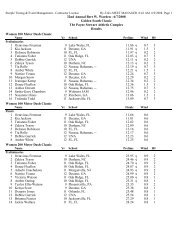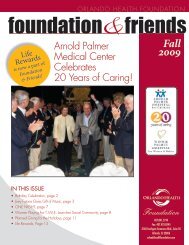Introduction to CV Pharmacology - Orlando Health
Introduction to CV Pharmacology - Orlando Health
Introduction to CV Pharmacology - Orlando Health
Create successful ePaper yourself
Turn your PDF publications into a flip-book with our unique Google optimized e-Paper software.
<strong>CV</strong> <strong>Pharmacology</strong><br />
who are unable <strong>to</strong> take clopidrogrel or aspirin, or for those in whom other agents have been<br />
ineffective.<br />
Indications<br />
Platelet aggregation inhibi<strong>to</strong>rs are used <strong>to</strong> reduce the risk of thrombotic events such as<br />
myocardial infarction and stroke in patients with previously diagnosed atherosclerotic vascular<br />
disease. They are also used with patients with acute coronary syndromes who are undergoing<br />
PCI.<br />
When a GPIIb/IIIa inhibi<strong>to</strong>r is used, aspirin and/or clopidogrel become part of the standard<br />
adjunct therapy, along with heparin or enoxaparin (Lovenox). The clinical indications for aspirin<br />
and clopidogrel continue <strong>to</strong> expand because platelets play such an important role in all types of<br />
vascular disease. For example, numerous studies have proven the efficacy with acute onset MI,<br />
stable and unstable angina, cath lab procedures, and non-hemorrhagic strokes.<br />
Precautions and Interactions<br />
Platelet aggregation inhibi<strong>to</strong>rs should not be used in any patients with active pathological<br />
bleeding such as peptic ulcer or intracranial hemorrhage. They are <strong>to</strong> be used with caution in<br />
patients who are at risk of increased bleeding due <strong>to</strong> impaired liver function, trauma or surgery.<br />
They should also be discontinued 7-14 days prior <strong>to</strong> elective surgery. Furthermore, drugs such as<br />
aspirin, heparin, warfarin, and NSAIDs that may interfere with hemostasis, are administered with<br />
extreme caution <strong>to</strong> patients taking ticlopidine or clopidrogrel.<br />
Adverse reactions include rash, nausea, vomiting, diarrhea, constipation, and abdominal pain.<br />
These reactions have resulted in discontinuing the drug in approximately 3% of patients taking<br />
clopidrogrel and 21% of patients taking ticlopidine. Blood dyscrasias as previously listed, may<br />
occur with either of these agents; the incidence is approximately 1 out of every 2000-4000<br />
patients taking ticlopidine and approximately 1 out of every 250,000 of those taking<br />
clopidrogrel. Because of its increased risk for adverse reactions, ticlopidine is rarely used & is<br />
usually given <strong>to</strong> patients unable <strong>to</strong> take other agents or in those for whom other agents are<br />
ineffective.<br />
In addition <strong>to</strong> the bleeding precautions for aspirin, there may also be some notable GI distress or<br />
bleeding. In such cases an enteric coated aspirin preparation may be suitable.<br />
© 2010 <strong>Orlando</strong> <strong>Health</strong>, Education & Development 47



